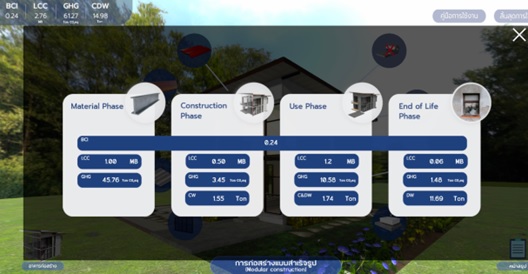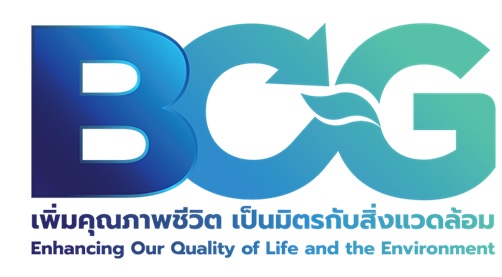There are a myriad of building materials currently available on the market, including materials derived from natural resources and waste. To help consumers make conscious decisions by choosing materials that are cost effective and environmentally friendly, the Technology and Informatics Institute for Sustainability (TIIS) of MTEC-NSTDA has developed a tool to determine environmental impact and material circularity indicator (MCI) of building materials according to the Bio-Circular-Green Economy (BCG) model. The data are presented in a 3D simulation model that is convenient to use and simple to understand. The project was funded by the Program Management Unit for Competitiveness (PMUC).

TIIS researcher Dr. Nongnuch Poolsawad said that the construction industry plays a vital role in the economic and social development as the sector is the foundation of infrastructure development and supports the growth and expansion of all other industries. However, without proper management from all players in the industry, including manufacturers, builders and demolition contractors, this sector can have massive negative impacts on the environment.

“TIIS and partners from the public and private sectors therefore came together to assess environmental impact and develop MCI data of building materials. Developed by the Ellen MacArthur Foundation, the MCI measures the circularity of a product based on four components: virgin feedstock, reused components, recycled feedstock, and product’s utility (the intensity of use and intended lifespan). The MCI has a scale of 0—1, 1 indicating a fully circular one,” Dr. Nongnuch explained.
The project scope covers 13 types of building materials. Data of 5 building materials - rebar, ready-mixed concrete, cement, insulation and plywood – have been completed and are ready for public distribution. The data are presented in a 3D simulation model, available for public access at www.nstda-tiis.or.th/3d-mci-bm.
The 2nd phase of the project - determining MCI data of the other 8 types of building materials, namely bricks, tiles, wall coverings, ceiling, doors and windows, pipes, bathroom fixtures, and roofing materials - is underway. The research team are planning to expand the project to cover other types of building materials, and also keep the MCI data up to date for all materials to track the trend of sustainable construction in Thailand.
In addition to the MCI data of building materials, TIIS has been working in partnership with Chulalongkorn University, King Mongkut’s University of Technology Thonburi, Rajamangala University of Technology Thanyaburi and public and private sectors to promote sustainable construction.

Dr. Nongnuch revealed that TIIS and partners have developed environmental indicators for both conventional construction and modular construction. Environmental indicators consist of BCI (building circular indicator), LCC (life-cycle costing), GHG (amount of greenhouse gas emissions), and CDW (construction and demolition waste). The designed system enables users to obtain BCI, LCC, GHG and CDW based on chosen materials and construction types.
“BCI is an extremely useful indicator in construction design as it determines the overall performance of a building according to circular potential. Though building materials made from recycled resources and modular construction are more costly, they are preferred choices when their incurred costs over the lifetime (LCC) and environmental impact are factored in. Careful construction design and planning can reduce waste considerably,” Dr. Nongnuch added. She expected the 3D simulation model will contain BCI and MCI of all 13 building materials by the first quarter of this year.
MCI and BCI data will make a great contribution to the construction industry. Building material manufacturers, real estate developers, contractors, and homeowners can all help reduce negative environmental impact from construction activities, making contribution to sustainable development under the Bio-Circular-Green Economy (BCG) model. TIIS supports the public and private sectors in utilizing proper tools to facilitate sustainable development. For more information, please visit: www.nstda-tiis.or.th.

